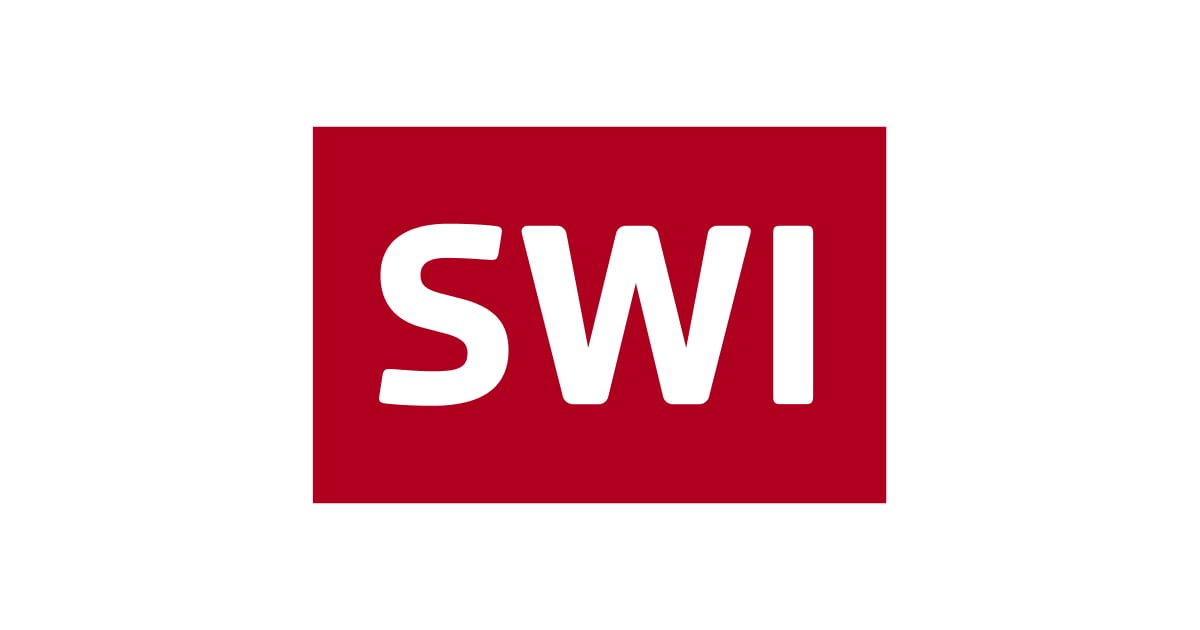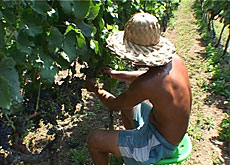Sipping in the city – Zurich’s urban vineyards

Think of Zurich and the first things that come to mind will often be banks, the stock market or perhaps expensive boutiques.
Less well known though is the city’s contribution to the Swiss wine-making industry.
With 615 hectares of grapes, the canton of Zurich is the largest wine-producing region in eastern Switzerland and the sixth most important in the country as a whole.
And although the vast majority of Zurich’s wines come from the canton’s rural fringe, there are still vineyards to be found in the very heart of the city.
“Most people have no idea that there are vineyards here,” says wine producer Marc Landolt as he shows swissinfo around the city’s Bürgli vineyard. “They almost can’t believe it, because they think that Zurich’s agriculture is only out in the countryside.”
Nestling above Lake Zurich, the 1.6 hectare site offers a magnificent view of the city centre, less than a ten-minute tram ride away.
“The fact that the wine is grown right here in the city certainly helps us market it to the local people,” says Landolt, whose family has been growing wine in Zurich for six generations. “But the real selling-point always has to be the quality of the wine, because our customers know exactly what they can expect of us by now.
“Being in the city does mean coping with slightly warmer temperatures than in the countryside, but that’s not too much of a problem. In fact, the steepness of the land and the proximity of the lake means that this is actually one of the best locations for wine-growing in the canton.”
Roman heritage
Winemaking was first introduced to the Zurich region by the Romans who established a fortified outpost in the second century AD on the ground where the city now stands.
However many of today’s vineyards have a much more recent history, reflecting a steadily growing interest in local wine.
The Bürgli vineyard is one such example. Although used for winemaking in medieval times, it was only returned to viticulture when the Landolt family began renting the site 17 years ago.
The Zweifel family, better known for its potato chip business, has also been busy reviving the city’s wine-growing fortunes from its headquarters in the Höngg district – after pulling out of the business in the middle of the last century.
“Wine was being produced in Höngg in the 1440s, although our family wine business didn’t start there on a commercial basis until the end of the nineteenth century,” Urs Zweifel told swissinfo.
“The family stopped making wine in Zurich just before the Second World War but began again in the early 1970s because we thought it was a good tradition that also offered strong business possibilities, for selling good Swiss wine around the world.”
Although well over 90 per cent of Swiss wine continues to be sold domestically, the Zurich winemakers have experienced some success already in their plans to expand abroad.
Zweifel has recently begun exporting wine to Britain and the company hopes soon to complete a similar deal with Belgian importers.
Improving quality
Since mass scale wine production will never be a possibility, Zurich’s wine producers have actually lowered the size of their harvests in recent years and concentrated on making better quality wine for more discerning wine drinkers.
“I think the Zurich wine producers are making very good progress now,” says German-born wine journalist Erich Grasdorf. “I like the unique style of some of the traditional local grapes such as the Räuschling. The increased use of modern methods along with some good recent vintages has seen the Räuschling becoming a really meaty wine.
“I reckon there is a chance for Swiss wine in general to improve its international reputation. After all, Switzerland produces more wine than New Zealand and the New Zealanders have managed to make a name for themselves in the wine world. Swiss wine will never have a large export capacity of course, but they are already drinking wine from canton Vaud in New York.
“I do think the restaurants here in Zurich could be doing more to promote the local wines, though. When you look around the restaurants in Vienna, you see Viennese wine being sold just about everywhere. Here they still seem a little reluctant.”
That’s a criticism that can’t be levelled at Orson’s restaurant, tucked away on the southern edge of Zurich city centre.
Overcoming prejudices
Specialising in local food and drink, the restaurant is one of the few Zurich establishments trying to overcome prejudices about the region’s wine, apparently with some success.
“In the past we did have a lot of customers from Zurich telling us that they didn’t like Zurich wine,” says assistant manager Ferdinand Michel. “But when we suggest one of the good Zurich wines, they are usually astonished at the quality of product that does exist in the region.”
Because Zurich’s restaurants can buy the local wines direct from the producers, and without paying the import tax levied on foreign wines, the home produce is often also cheaper than the international competition.
Thanks to wine snobbery, though, that’s not always a good thing for the image of local wine.
“If someone brings guests to the restaurant it might be a problem for them to suggest a cheaper wine, even if it is excellent,” Michel points out.
Grasdorf agrees that low prices may actually be damaging the reputation of the local wine, but stresses that he’s not proposing a price hike.
“Of course there are people who simply choose their wine according to the label. Just as when someone buys an Armani shirt for three times the cost of one of Switzerland’s Switcher shirts, it’s not purely a question of quality.
“I’m not saying that Zurich’s wine should become more expensive, just that the prices of wines in general should more accurately reflect their worth. In that respect, Swiss wines can certainly hold their own against the international competition.”
swissinfo, Mark Ledsom in Zurich
The canton of Zurich is Switzerland’s sixth-largest wine producer, growing 615 hectares of grapes.
Several vineyards can be found within the city itself, although these account for only around ten hectares of the total.
Wine was originally cultivated in the region by Roman settlers, but only became an established part of local farming in the ninth century.

In compliance with the JTI standards
More: SWI swissinfo.ch certified by the Journalism Trust Initiative












You can find an overview of ongoing debates with our journalists here . Please join us!
If you want to start a conversation about a topic raised in this article or want to report factual errors, email us at english@swissinfo.ch.